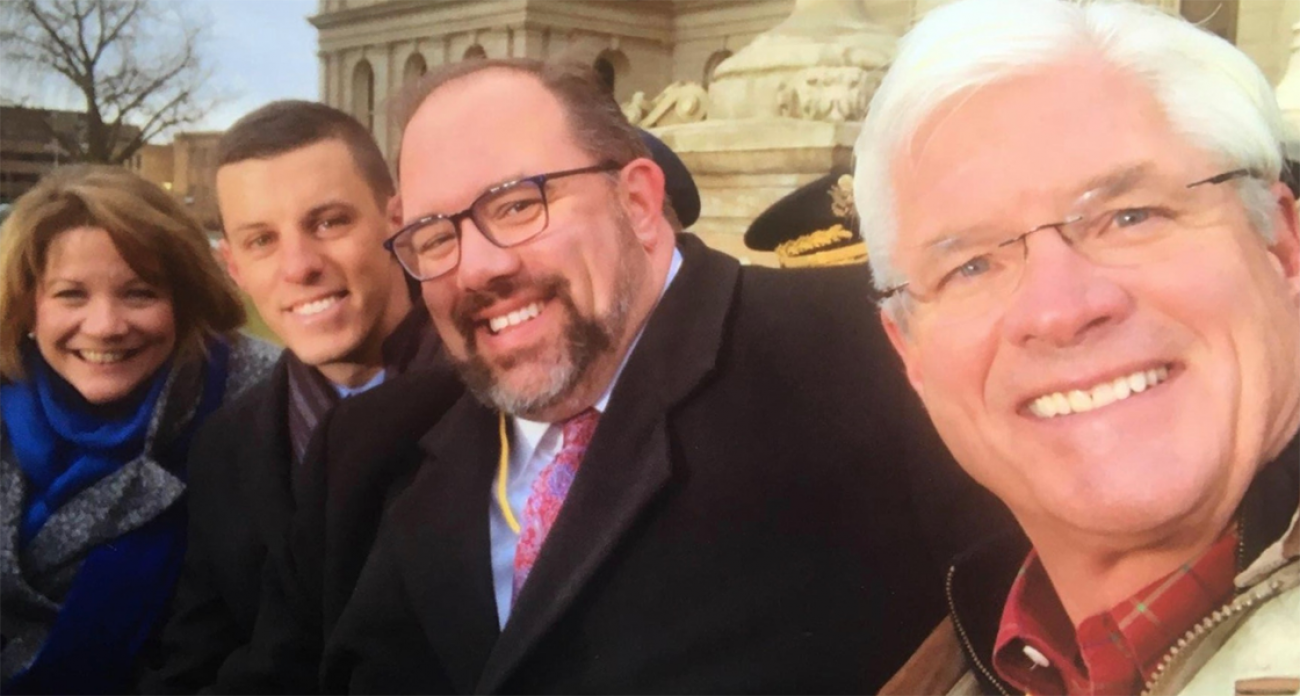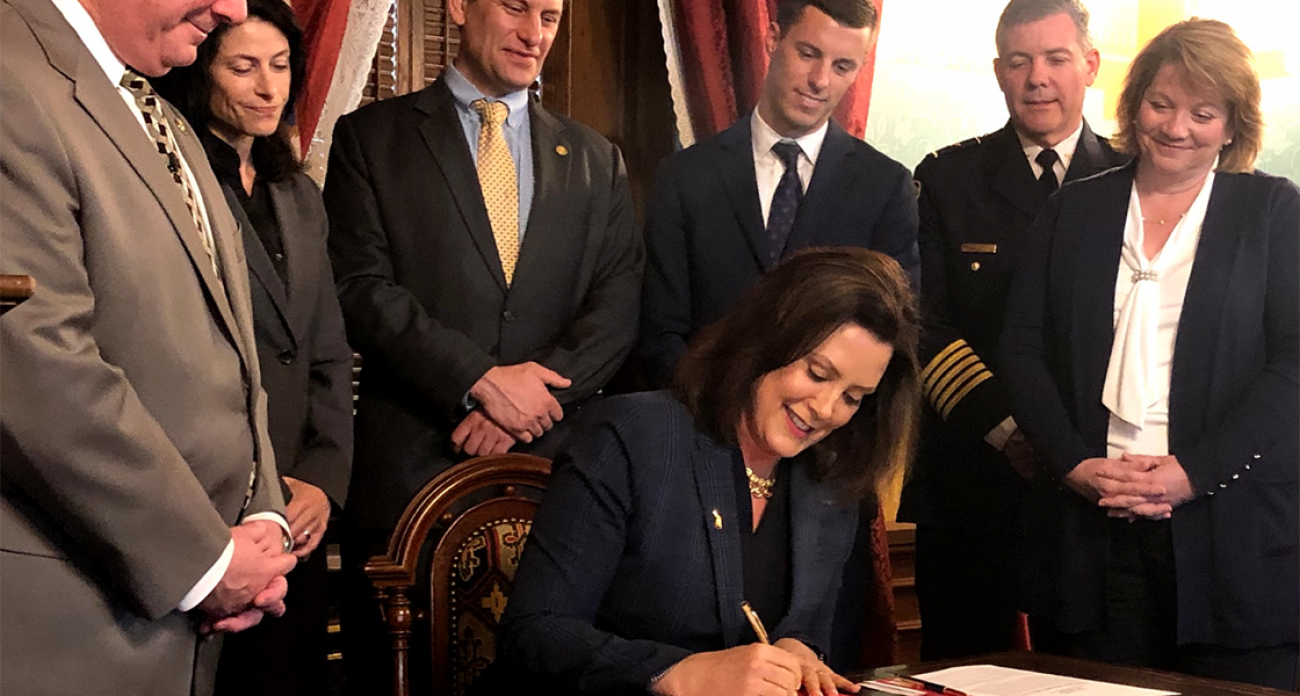Five months in, the precarious state of bipartisanship in Lansing

LANSING — It was a bipartisan milestone: Republican House Speaker Lee Chatfield, Democratic Gov. Gretchen Whitmer and legislators from both parties gathering together this month as Whitmer signed criminal justice reforms into law.
The ceremony was a public display of political goodwill in Lansing. The legislation — to prevent police from taking ownership of suspects’ property if they are not convicted — had strong support on both sides of the aisle.
But less than 10 hours earlier, in the middle of the night, Chatfield, R-Levering, got all 58 House Republicans to pass a bill to fundamentally change Michigan’s no-fault auto insurance law — a feat that had eluded the House for years. In doing so, he had bypassed a committee set up to develop a bipartisan plan. By the time the sun was up that morning, Whitmer had promised a veto, and the House’s Democratic leader had accused Chatfield of lying to her face about working together.
And so it has gone nearly five months into divided government, as GOP leaders and a Democratic governor lurch between bipartisan overtures and political maneuvering. Now, whatever early congeniality existed between the parties is being put to the first big test.
Lansing’s road to bipartisanship
Michigan’s Democratic governor and GOP leaders have agreed (and disagreed) on a number of policy issues since January
Where they’ve agreed:
- Criminal justice reforms, including civil asset forfeiture (Gov. Gretchen Whitmer signed civil asset forfeiture into law, other bills pending)
- College scholarships and program to help adults complete degrees or certificates (bipartisan bill package introduced)
- Snow day forgiveness (Whitmer signed law that allows public schools to avoid making up some missed days due to winter weather emergency
Areas in conflict:
- Road funding (though a compromise is possible; GOP concedes more revenue may be needed)
- Abortion (Whitmer said she will veto a restriction; AG Dana Nessel promises never to prosecute abortion cases)
- Restructuring DEQ (Legislature rejected Whitmer’s executive order because it removed oversight panels Republicans created; Whitmer resubmitted order keeping panels intact)
- No-fault auto insurance (Whitmer and GOP still negotiating terms of a deal)
- GOP cuts to state departments (Democrats call them politically motivated)
Whitmer, Chatfield and Senate Majority Leader Mike Shirkey seem to have moved past sniping over the Republican no-fault bills and are now said to be deep into negotiations on auto insurance.
But even if they reach a deal, the fault lines will soon extend to other critical issues facing Michigan, from more than $2 billion needed for road funding, to an oil pipeline in the Straits of Mackinac and the legal brawl over legislative redistricting in Michigan.
The early skirmishes are not unusual in times of divided government, as new leaders at the Capitol learn how the others operate, several people close to the legislative process told Bridge. Each challenge becomes a test of how far to push boundaries and when to extend an olive branch, they said.
Still, Democratic and Republican leaders appear to recognize that voters, who have said they don’t trust state government, are demanding solutions on critical problems facing the state: Roads, water, PFAS, schools and auto insurance.
“These are big issues. (There are) not simple solutions, and it takes tough votes,” said Dianne Byrum, a former House Democratic Leader and a partner in East Lansing-based public relations firm Byrum & Fisk Advocacy Communications.
“It’s early in the process,” Byrum said. “I still think there’s an opportunity for a grand bargain here.”
Overall, several consultants, lawmakers and other legislative insiders said, the level of bipartisanship in Lansing remains relatively high — certainly higher than during the previous eight years, when Republicans controlled both chambers and the governor’s office. Whitmer meets weekly with Chatfield and Shirkey, joined by two top Democrats — House Democratic Leader Christine Greig, D-Farmington Hills, and Senate Minority Leader Jim Ananich, D-Flint — to discuss policy priorities.
But that collaboration could be upended by the federal ruling in April that Michigan’s legislative and congressional districts were illegally gerrymandered by Republicans back in 2011. The judges ordered some districts redrawn and some state senators to run for reelection in 2020, two years earlier than scheduled.
It’s still uncertain whether the Republican-led Legislature will have to follow through on that order, because the U.S. Supreme Court may render that decision moot through a highly anticipated redistricting decision expected in June.
How the redistricting battle plays out may impact whether Republicans and Democrats continue to seek consensus on Michigan’s toughest challenges, from road funding to auto insurance.
Will legislators be willing to compromise on difficult votes knowing they could face a primary challenge within their own party? And if a voting district becomes more evenly divided, will legislators be more inclined to tout their bipartisan credentials to win votes in a tightly contested general election?
“We’ve never seen anything like this,” said John Truscott, CEO of Lansing-based public relations firm Truscott Rossman, of the uncertainty over redistricting. “This makes things at least 10 times more difficult.”
The path to conflict
On the first day of the legislative session in January, Chatfield and Democratic Attorney General Dana Nessel — in many ways ideological opposites — stood shoulder to shoulder on the House floor and announced the civil asset forfeiture package as their first bills of the year, and a commitment to work toward bipartisan solutions.
“I have said from the very beginning that this chamber is going to find areas of common ground where we can all work together to pursue real solutions to help the people we represent,” Chatfield told reporters at the time.
And to a certain extent, they have.
Republicans and Democrats have worked together on bills to increase the age of who is considered a juvenile in the criminal justice system, reform the cash bond system, allow parole for medically frail prisoners and approve funding for a Whitmer workforce training plan, among other things.
No-fault auto insurance may turn out to be another success. After the Senate passed its plan, the House followed more than a day later with additional provisions sponsored by Democrats. And all sides have pointed to progress in talks.
But political observers said from the start of the year that the real test of bipartisanship would come once money is on the line — after the governor’s budget recommendations in March.
As promised, sparks flew.
Whitmer proposed a massive 45-cents-per-gallon tax increase on gas to raise the additional $2.5 billion needed to repair roads and other infrastructure. Republicans summarily rejected her proposal, indicating they would find ways to cut spending in other areas to gather the necessary funds — teeing the factions up for a standoff.
Nessel more recently inflamed GOP anger when she said she’d refuse to prosecute abortions in Michigan if Roe v. Wade is overturned and that she’d do everything she can to shut down Canadian energy giant Enbridge Inc.’s Line 5 pipeline in the Straits, among other things. Meanwhile, Republicans recently passed legislation that would ban a common second-trimester abortion procedure, over the objections of Democrats.
When Republicans in the House and Senate released their budget proposals, included were double-digit percentage reductions in Nessel’s and Democratic Secretary of State Jocelyn Benson’s budgets.
Democrats saw a politically motivated power play. Republicans say they were just good-faith efforts to direct more money toward road repair and schools.
Sen. Jim Stamas, R-Midland and chairman of the powerful Senate appropriations committee, noted that other state departments, including Treasury and Technology, Management and Budget, also received general fund cuts to pay for those priorities.
“(It) was not my intent to send a message,” Stamas told Bridge.
“That’s politics,” Ananich countered. “It was obvious they’re taking a shot at them because they didn’t like some of the things they did.”
Truscott, the former press secretary for Republican Gov. John Engler, said the moves and countermoves are “exactly what you would expect to see” in divided government, and not necessarily a sign of a stalemate.
“There will be times when they have to take on the opposition and say some pretty tough things,” he added, “but behind the scenes, they’re still talking and texting and working things out.”

Commitment to communication
It has been 13 years since Michigan faced similar political division in state government, when Jennifer Granholm, a Democrat, was governor and both houses of the state Legislature were controlled by Republicans.
By the end of Granholm’s first term, leaders of different parties were barely speaking, said Sarah Hubbard, principal of Lansing-based lobbying firm Acuitas. Policymaking deadlocked and personalities clashed.
That’s not happening yet this legislative term, Hubbard said.
“They’re on the same planet here, at least,” she said. “They’re talking about the same issues, even if they’re coming from different directions. You’re not seeing a complete breakdown in communication.”
All four leaders in the state Legislature noted in interviews with Bridge that communication is proving to be their strength.
“We knew going in there were going to be areas of disagreement,” Greig said. “We talk regularly and touch base on where we are on processes.”
The leaders set a goal early in the term “to ensure that what defined us was our ability to come together and find real consensus on important issues,” Chatfield said.
While Republicans pushed through huge priorities during the last eight years of GOP control under former Gov. Rick Snyder, including business tax cuts and right-to-work laws, there were divisions even among members of the same party. Take, for instance, the infamous animus between former Senate Majority Leader Arlan Meekhof and House Speaker Tom Leonard, between Snyder and Attorney General Bill Schuette, and Snyder and the Legislature when he vetoed GOP-backed legislation.
By comparison, Senate leader Shirkey and House leader Chatfield appear to get on well, and both have a respectful working relationship with Whitmer. When there are disagreements, they are often public, which is a good thing — it adds transparency to the process, Hubbard said.
Shirkey, R-Clarklake, agreed, saying he’s OK with differences.
“I have no fear in split government,” he said, calling it healthy. “We may have gotten a little bit lazy in the last eight years, taking too much for granted, and losing our edge in making our arguments and strategizing.”
Democrats Nessel and Benson both condemned Republicans’ proposed budget cuts, but said they, too, are keeping lines of communication open to debate changes. Stamas, the Republican Senate appropriations chair, said he also has worked to reach out to them.
Nessel and Benson said they have a good working relationship with Chatfield, but noted some tension with Shirkey, who is at odds with Benson on transparency initiatives such as financial disclosure requirements for legislators, and with Nessel over her vow not to enforce abortion laws should abortion return to being illegal in Michigan.
Whitmer, for her part, “has always made it clear she is willing to work with anyone who is willing to work with her,” said the governor’s spokeswoman, Tiffany Brown, though she added Whitmer still will only sign a budget that includes roads and infrastructure funding, among other things.
Where do (and don’t) they agree?
Common ground has been easy to find in spots.
The Michigan Chamber of Commerce stood with Whitmer and lawmakers from both parties to introduce legislation that would create college scholarship programs and help adults complete certificates or degrees, in part on the premise that it can be done without new taxes, as Whitmer has promised.
“We take her at her word,” said Rich Studley, the chamber’s president and CEO, whose group’s business members have identified closing the state’s skills gap as a top priority.
Reaching a compromise on no-fault auto insurance and road funding could prove more challenging.
John Sellek, CEO of Harbor Strategic Public Affairs and spokesman for former GOP Attorney General Schuette, said Whitmer’s talk of a hard-line veto of the GOP auto insurance bills inadvertently helped Republicans muster enough votes to pass no-fault reform by turning the issue into a power struggle when it didn’t have to be.
Studley said achieving a deal on no-fault could be “the key to opening the door” on a road-funding compromise and, later, creating the scholarship programs.
Greig, the House Democratic Leader, said she thinks the large number of teachers elected to the Legislature this term — on both sides of the aisle — could pose opportunities for bipartisan education policy.
Redistricting wild card
Any bipartisan goodwill could be upended with the bombshell federal court decision last month that could require dozens of Michigan legislative districts to be redrawn by August, and for both House and Senate members to run in potentially new districts.
Several people told Bridge the fallout from the court ruling is so uncertain that it’s impossible to say how legislation will be impacted.
In some districts across the state, voters lean so heavily toward one party that the winner has essentially been decided in the August primary election, not the general election in November.
New maps could change that dynamic, said Robert McCann, a Democratic political consultant who worked as Whitmer’s chief of staff while she served in the Senate.
If your district suddenly becomes more politically mixed, “you’re going to want to tell people you can reach across the aisle,” McCann said.
“There’s no question that the redistricting ruling, if it moves forward, changes everything in terms of how political capital is going to get spent,” he said.
Regardless of what happens, legislators and Whitmer know voters are demanding results out of Lansing, Sellek said.
“Is (the redistricting ruling) in the back of people’s minds? Of course,” Sellek told Bridge. “Regardless of all that, if they have made progress and they have a record to run on … they all are in a much better place.”
See what new members are saying about why they donated to Bridge Michigan:
- “In order for this information to be accurate and unbiased it must be underwritten by its readers, not by special interests.” - Larry S.
- “Not many other media sources report on the topics Bridge does.” - Susan B.
- “Your journalism is outstanding and rare these days.” - Mark S.
If you want to ensure the future of nonpartisan, nonprofit Michigan journalism, please become a member today. You, too, will be asked why you donated and maybe we'll feature your quote next time!




